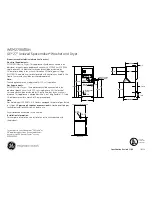
20
Operator's Manual
MAINTENANCE-EVERY 3 MONTHS:
CHANGE WATER PUMP OIL: Ensure unit is off and unplugged. Change
the pump oil after the first 50 hours of operation. After initial change,
every 3 months or 500 hour intervals are recommended. If oil appears
dirty or milky, changes may be required in greater frequency. Use
SAE20 or 30 non-detergent pump oil and fill only to the center of the
oil sight glass. DO NOT overfill.
REPLACE HIGH PRESSURE NOZZLE: Water flow through the spray
nozzle will erode the orifice, making it larger, resulting in a pressure
loss. Nozzles should be replaced whenever pressure is less than
85% of the maximum. The frequency of replacement will depend
upon such variables as mineral content in the water and number of
hours the nozzle is used.
BELT INSPECTION: Ensure unit is off and unplugged. Open the access
panel by unscrewing the two side knobs that secure the panel in place.
Slide the motor/pump assembly out. Inspect the v-belt for wear and
tightness. If the v-belt needs to be replaced or tightened, follow the
procedures listed below.
Replacement:
1. Loosen the four pump mounting bolts (A).
2. Loosen the two alignment nuts approximately one inch on the
alignment bolts (B1 & B2).
3. Slide the pump toward the motor to loosen belts.
4. Remove and replace belt.
Tighten:
(If v-belt was not replaced, you will need to loosen the nuts
on the alignment bolts B1 and B2 before proceeding.)
1. Tighten B2 alignment bolt. The pump will shift to the left until
there is tension on the belt. Then tighten B2 nut.
2. Tighten B1 alignment bolt, until sheaves are straight. (Use a
straightedge for alignment.)
3. Push on the v-belt to check belt deflection for tension. There
should be 1/4" to 1/2" deflection for correct tension.
4. If sheaves are straight and tension is correct, tighten B1 nut and
the four pump mounting bolts (A).
5. If tension is not correct, repeat steps 6 and 7 until correct alignment
and tension is achieved. Tighten the four mounting bolts (A) when
completed.
6. Loosen B2 nut, tighten B2 bolt, tighten B2 nut.
7. Loosen B1 nut, tighten B1 bolt, tighten B1 nut.
BURNER AIR ADJUSTMENT: The air shutter has been factory preset for
proper operation between sea level and 2000 feet elevation at standard
conditions (60°F ambient water and air temperatures). In colder
temperatures or higher altitudes, it may be necessary to adjust the
air supply to the combustion chamber. This adjustment will maximize
burner efficiency and avoid inefficient operation or excessive sooting
of the heat exchanger coil. A smoke spot test is recommended during
any air shutter and band adjustment. If you do not have the equipment
to perform a smoke spot test, follow the procedures listed below.
1. The machine must be running and the burner ON.
2. Loosen the Locking Screw (#3 at left) on the shutter.
3. Check for smoke from the heat exchanger exhaust. If smoke is
not present, slowly close the Air Shutter (#1 at left) by moving the
dial counterclockwise to a lower number. Continue moving the
dial until smoke appears.
4. Record this setting.
5. Open Air Shutter (#1 at left) two increments. Example: If Air
Shutter was set at 2, move it to 4.
6. Slowly trigger the gun on and off. This will cause the burner to
turn on and off. Look for a smoke puff when the burner ignites.
7. Repeat steps 5 and 6 until a smoke puff is noticed. Record the
Air Shutter Setting.
8. The difference between the recorded settings in steps 4 and 7
is the combustion window. Set the dial 1/2 way between these
settings.
NOTE: If you are unable to detect a setting on either step 3 or 7, more or less
air may be needed to achieve a proper combustion window. Loosen
the Bolt (#4 at left) and open the Air Band (#2 at left) in 1/4" increments.
Repeat steps 3-8 until proper combustion window is achieved.
TEST WATER & FUEL PRESSURE: These procedures should be
performed by an authorized service technician.
TEST WATER TEMPERATURE: This procedure should be performed by
an authorized service technician.
STORAGE & MAINTENANCE
Summary of Contents for HHB Series
Page 8: ...8 Operator s Manual HHS FEATURES FEATURES HHS_HHB 021714 RJA ...
Page 32: ...32 Manuel de l utilisateur ÉLÉMENTS CONSTITUTIFS DU HHS FEATURES HHS_HHB 021714 RJA ...
Page 73: ...Manual del operario de las lavadoras de chorro a presión 73 NOTA ...
Page 74: ...74 Manual del operario de las lavadoras de chorro a presión NOTA ...
















































